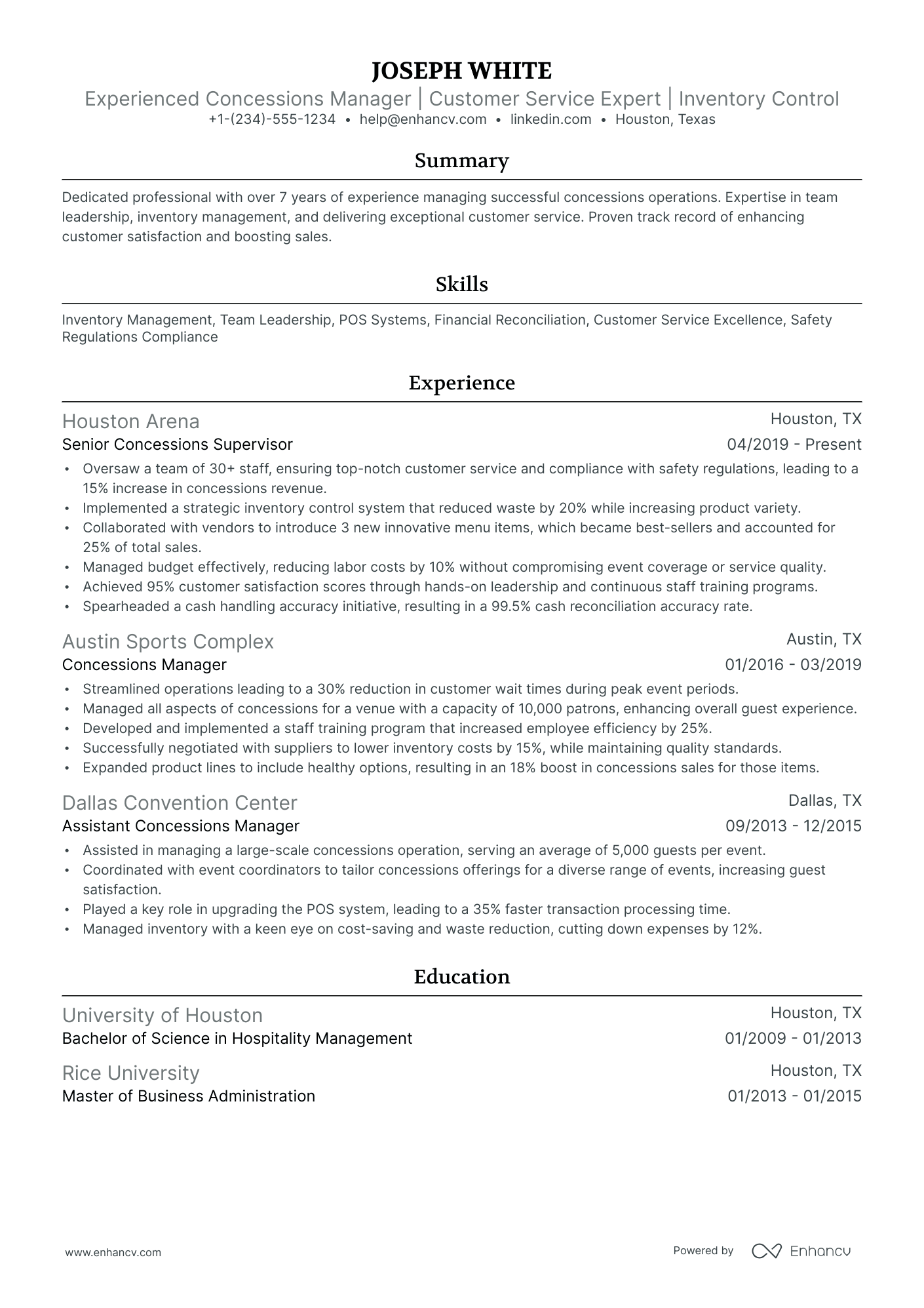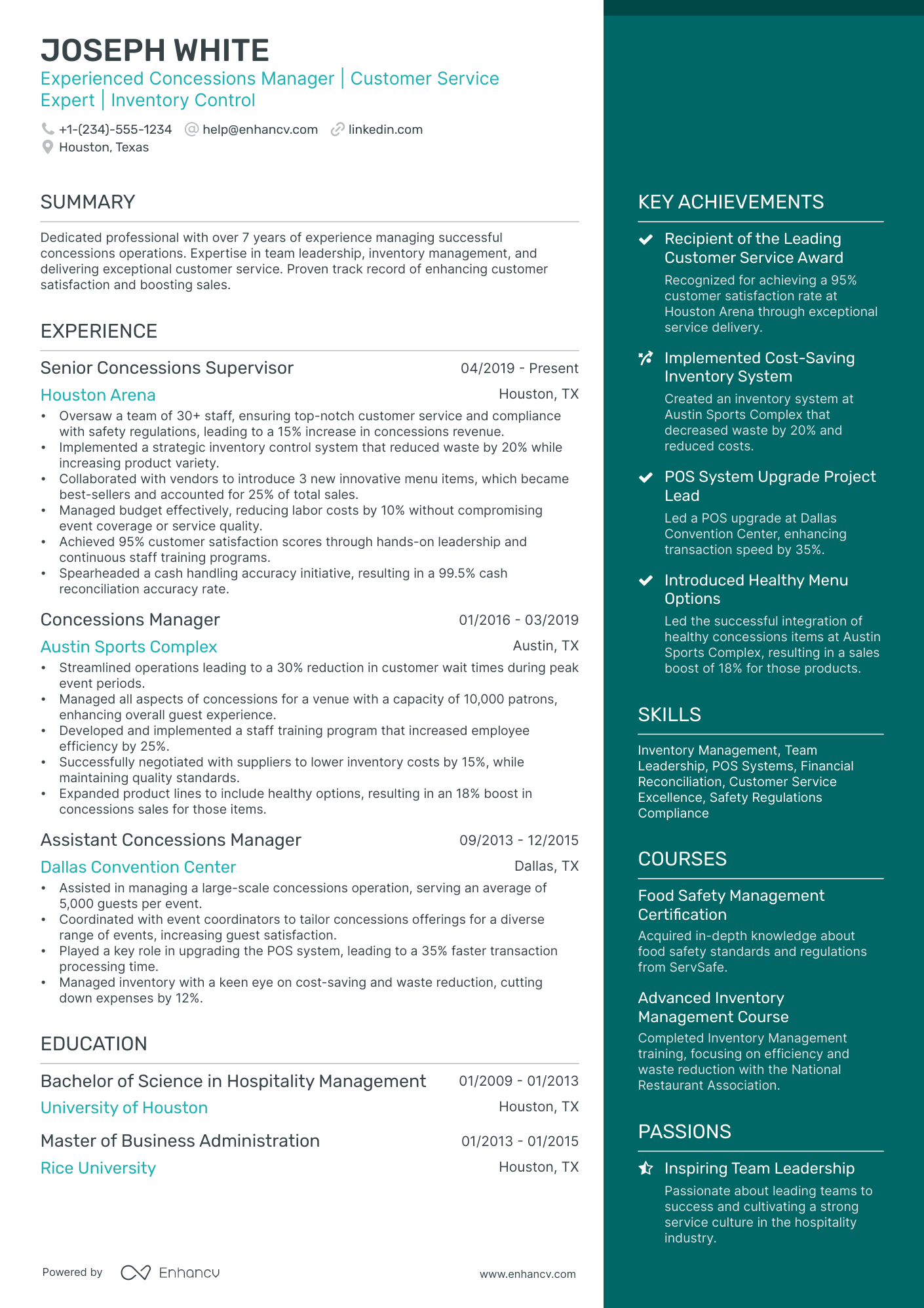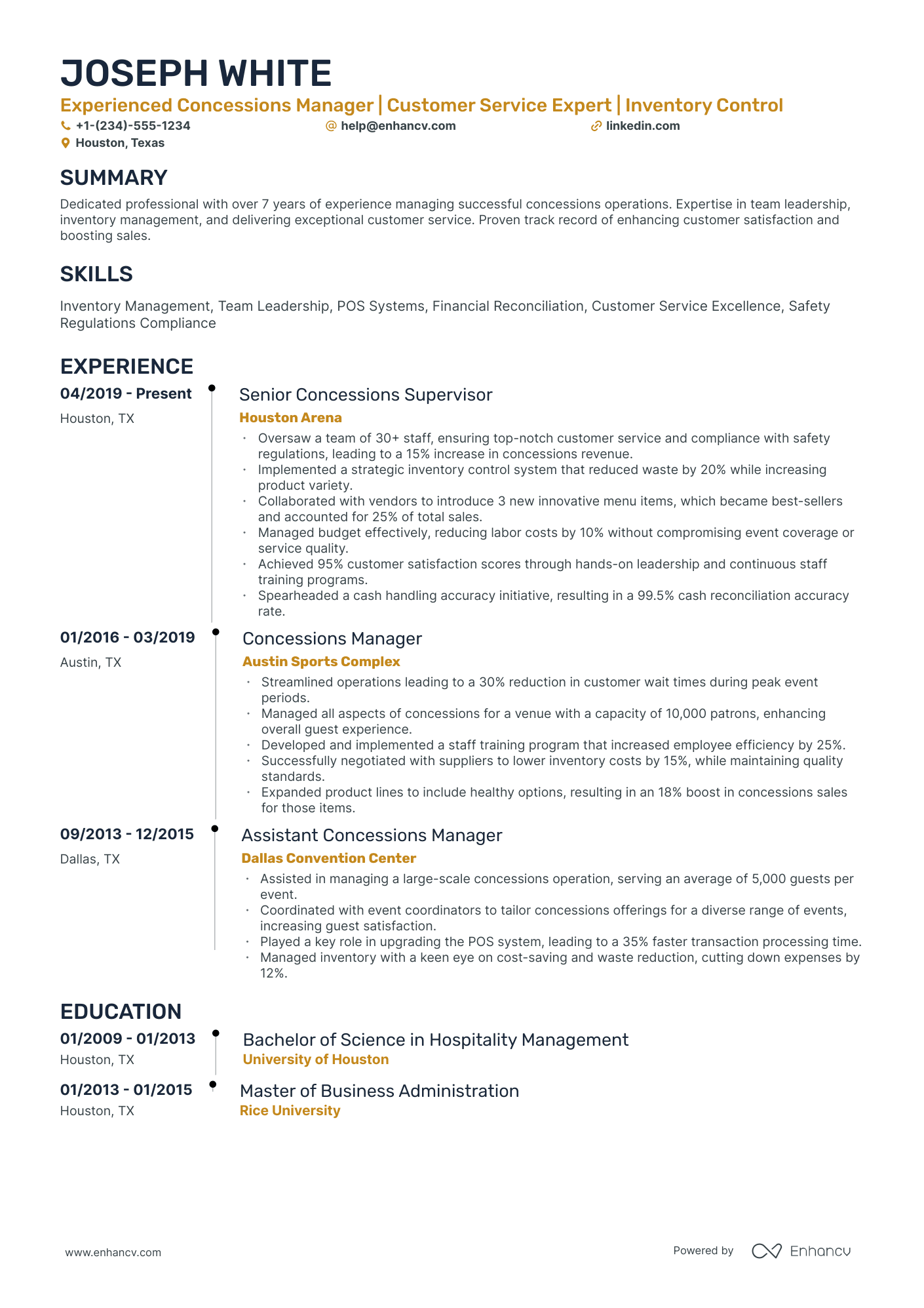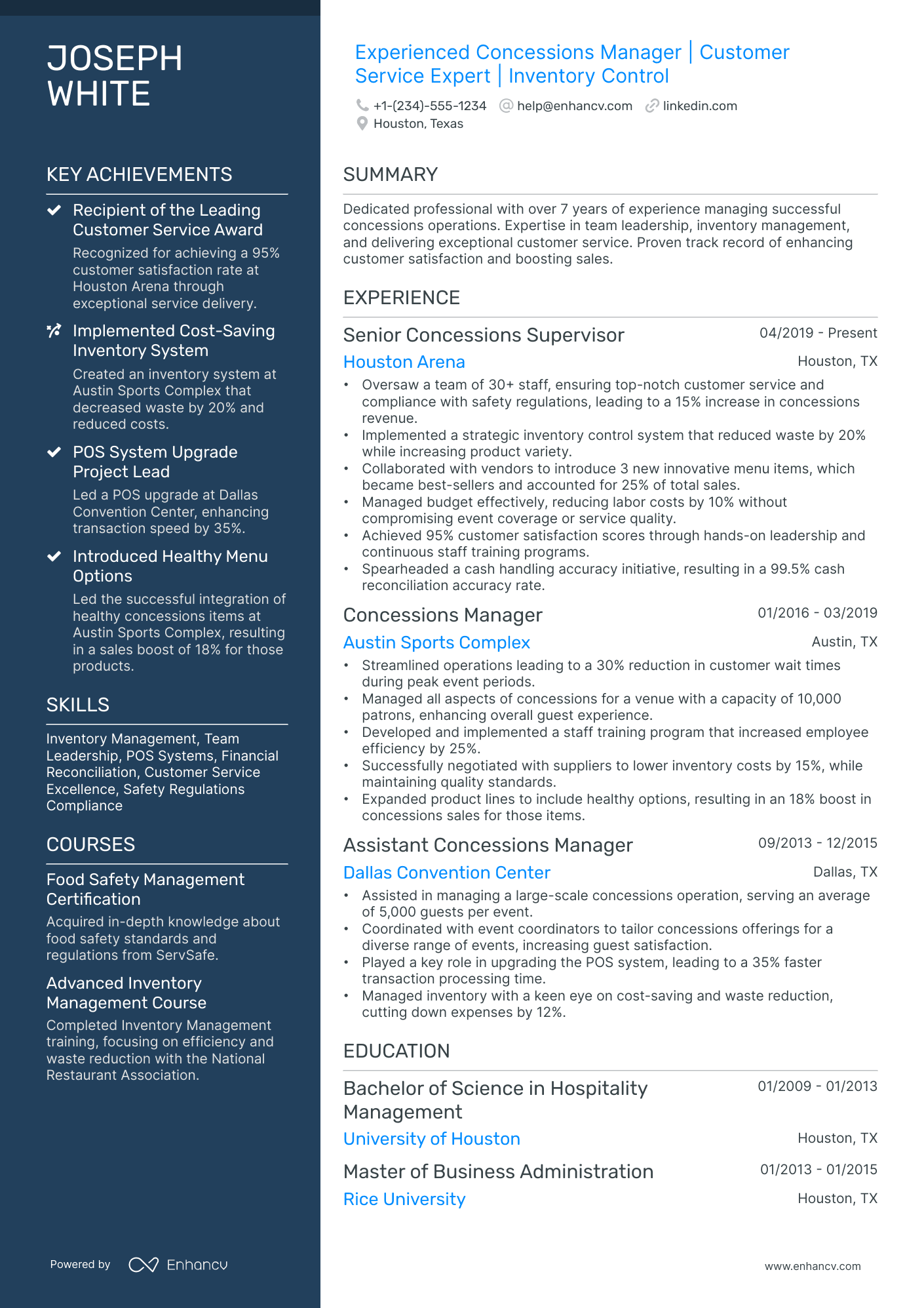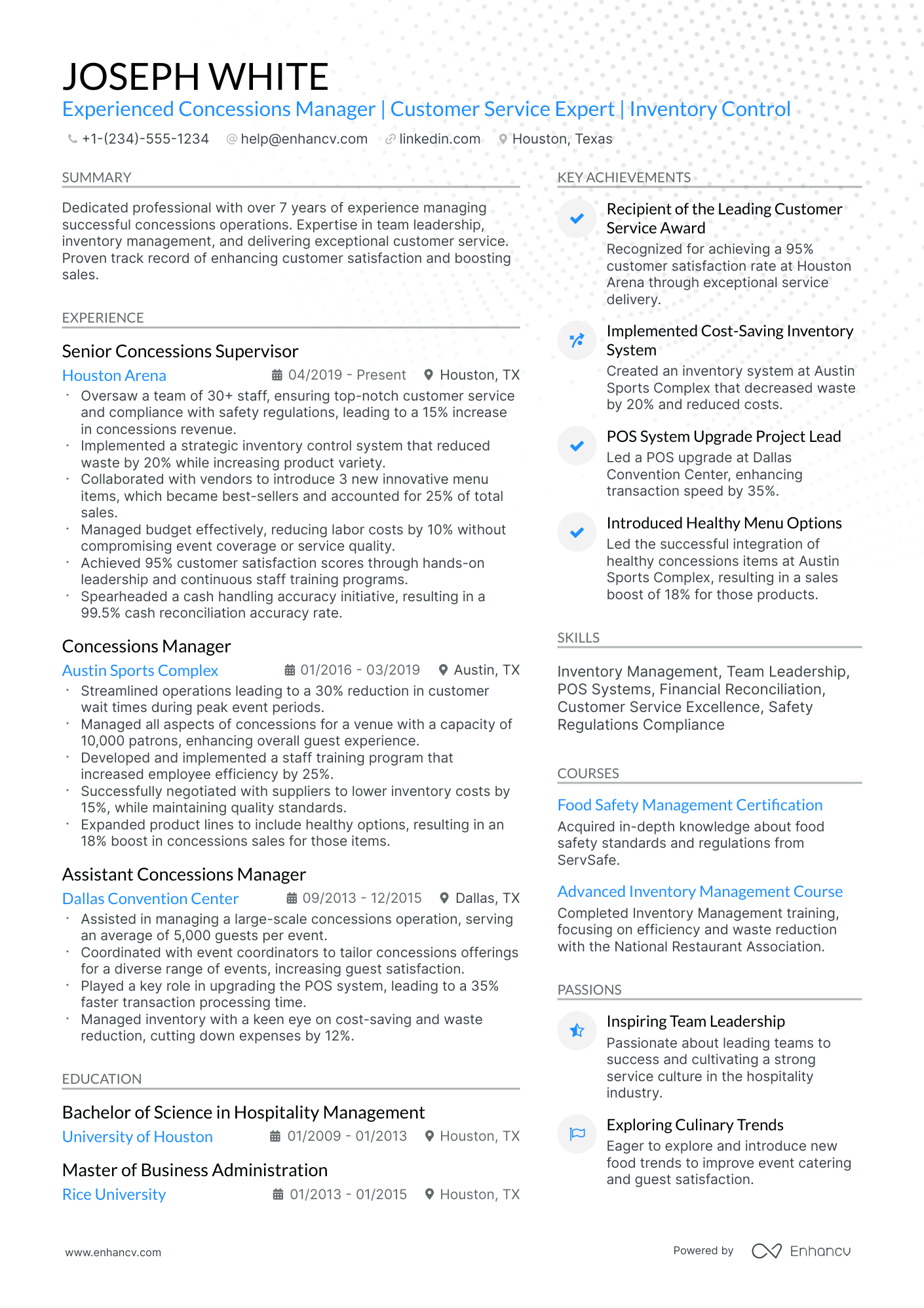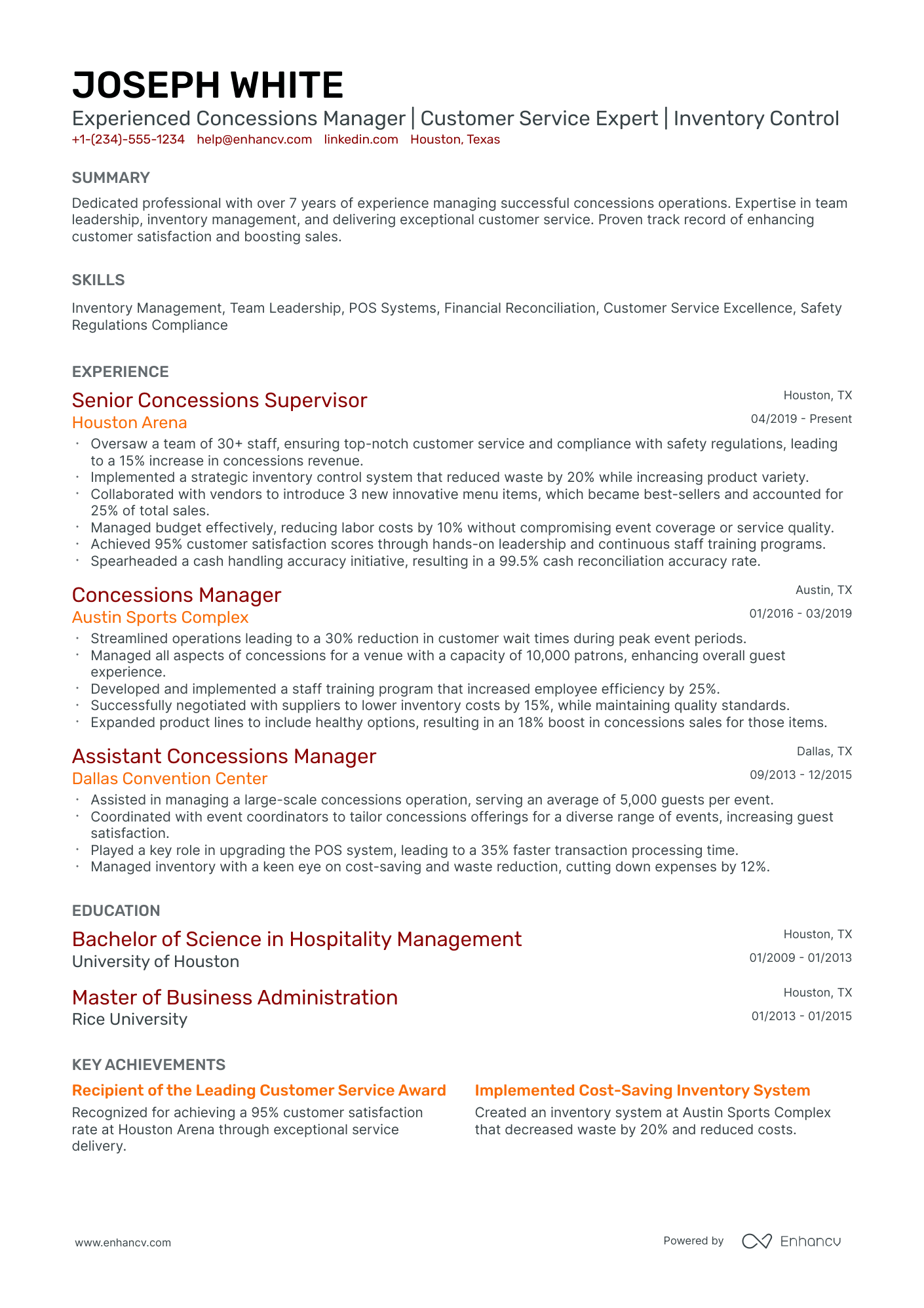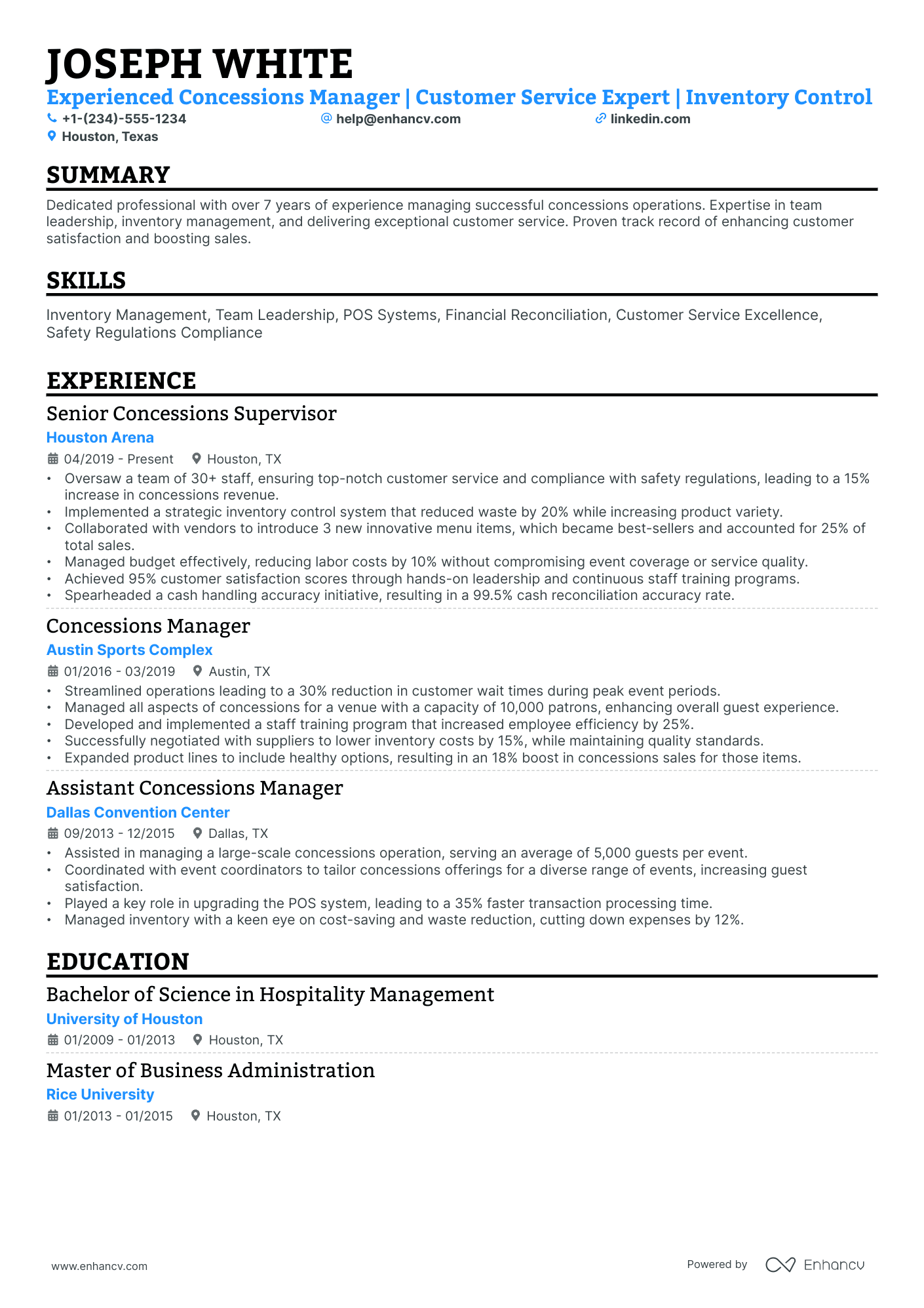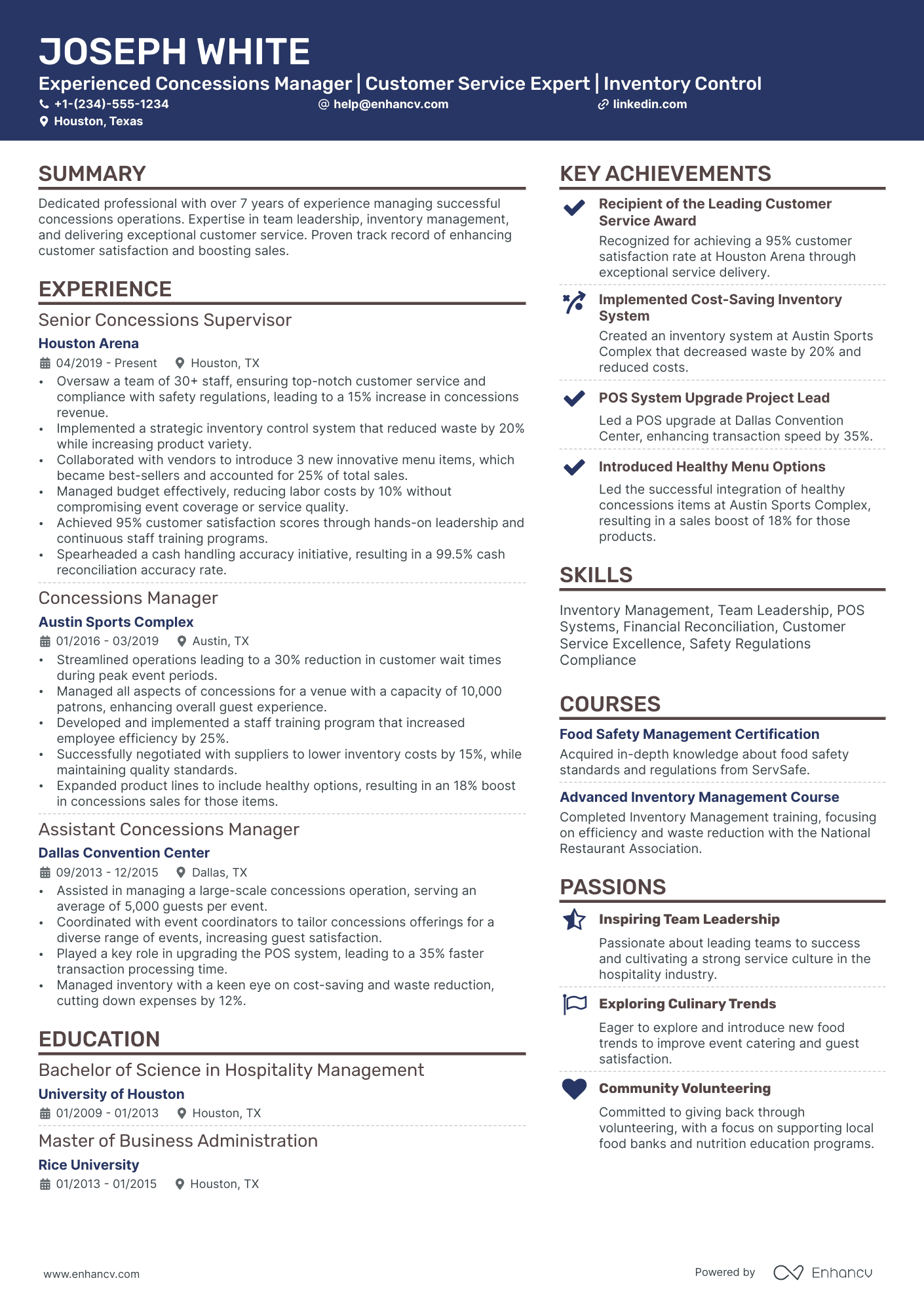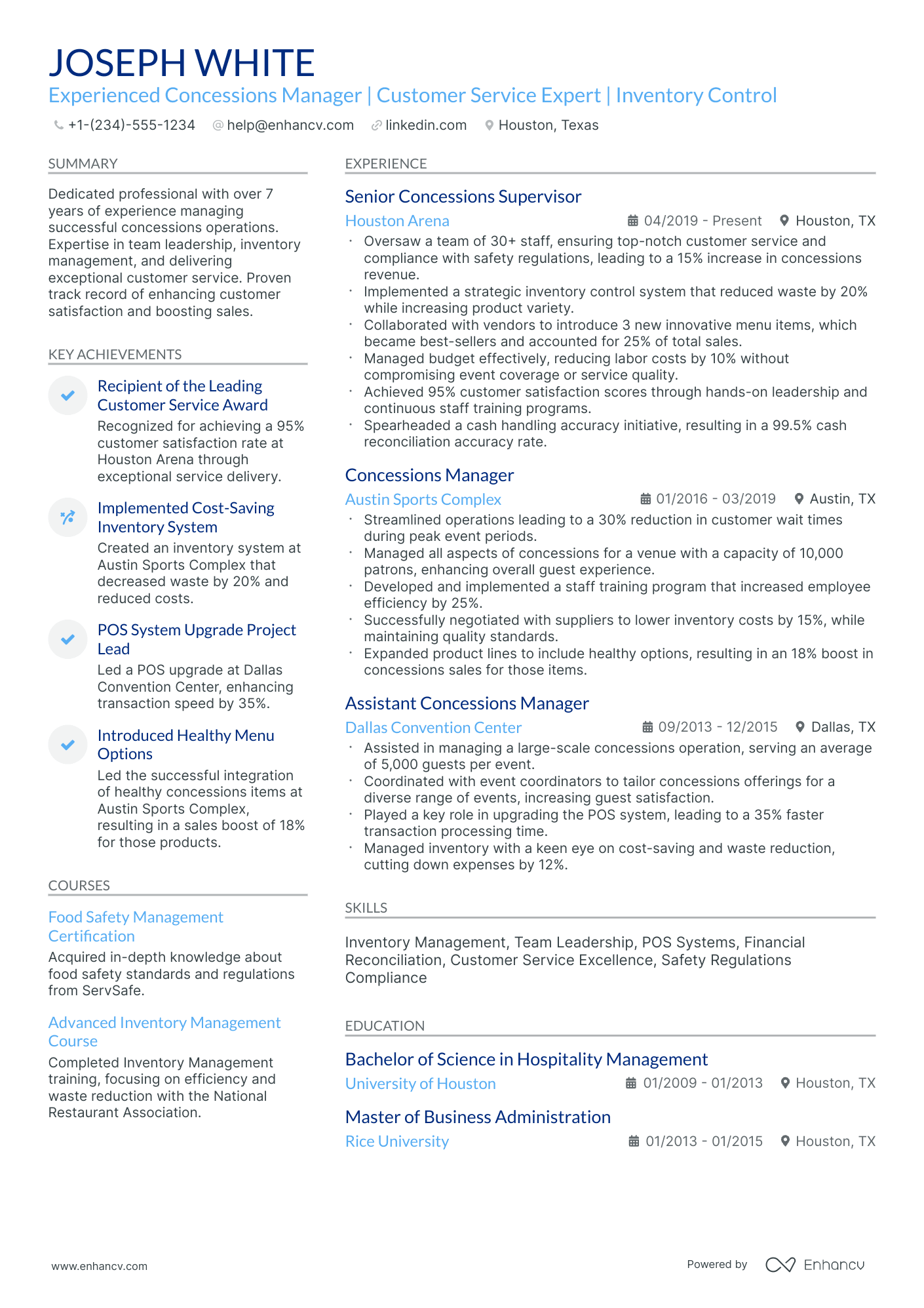As a venue manager, articulating the breadth of your event coordination and facility management experience in a concise manner can be a daunting resume challenge. Our guide offers tailored strategies to help you distill your diverse skills and achievements into a powerful resume that clearly demonstrates your expertise to potential employers.
- Incorporate venue manager job advert keywords into key sections of your resume, such as the summary, header, and experience sections;
- Quantify your experience using achievements, certificates, and more in various venue manager resume sections;
- Apply practical insights from real-life venue manager resume examples to enhance your own profile;
- Choose the most effective venue manager resume format to succeed in any evaluation process.
- Environmental Consultant Resume Example
- Small Business Manager Resume Example
- Business Continuity Manager Resume Example
- Business Development Consultant Resume Example
- Hotel General Manager Resume Example
- Revenue Cycle Manager Resume Example
- Demand Planning Manager Resume Example
- Commodity Manager Resume Example
- Deputy Manager Resume Example
Formatting the layout of your venue manager resume: design, length, and more
When it comes to the format of your venue manager resume , you've plenty of opportunities to get creative. But, as a general rule of thumb, there are four simple steps you could integrate into your resume layout.
- If you have plenty of experience, you'd like to showcase, invest in the reverse-chronological resume format . This format focuses on your latest experience items and skills you've learned during your relevant (and recent) jobs.
- Don't go over the two-page limit, when creating your professional venue manager resume. Curate within it mainly experience and skills that are relevant to the job.
- Make sure your venue manager resume header includes all of your valid contact information. You could also opt to display your professional portfolio or LinkedIn profile.
- Submit or send out your venue manager resume as a PDF, so you won't lose its layout and design.
Be mindful of regional differences in resume formats – a Canadian layout, for instance, might vary.
Upload & Check Your Resume
Drop your resume here or choose a file. PDF & DOCX only. Max 2MB file size.
PRO TIP
If you happen to have plenty of certificates, select the ones that are most applicable and sought-after across the industry. Organize them by relevance to the role you're applying for.
Traditional sections, appreciated by recruiters, for your venue manager resume:
- Clear and concise header with relevant links and contact details
- Summary or objective with precise snapshot of our career highlights and why you're a suitable candidate for the venue manager role
- Experience that goes into the nuts and bolts of your professional qualifications and success
- Skills section(-s) for more in-depth talent-alignment between job keywords and your own profile
- Education and certifications sections to further show your commitment for growth in the specific niche
What recruiters want to see on your resume:
- Proven experience with event planning, coordination, and execution
- Strong organizational and project management skills
- Demonstrated ability to manage budgets and negotiate with vendors
- Knowledge of health and safety regulations applicable to event spaces
- Experience in staff supervision and customer service excellence
The experience section or the essence of your professional venue manager resume
Recruiters always have and always will appreciate well-written venue manager resume experience sections.
The experience section is perhaps the most crucial element of your professional presentation, as it needs to answer job requirements while showcasing your technical expertise and personality.
Create your best resume experience section yet by:
- Selecting only relevant experience items to the role you're applying for;
- Always ensure you've listed a metric to quantify your success alongside each experience item;
- Create a narrative that showcases your venue manager career succession: this goes to show the time and effort you've invested in the field to build your experience from the ground up;
- Within each experience bullet, consider a problem you've solved, the skills you've used, and the bigger impact this has made in the organization.
Take a look at how other real-life professionals have curated their experience with the venue manager samples below:
- Spearheaded the launch of new concert series at the venue, attracting over 10,000 attendees across the event dates, significantly boosting the venue's profile in the local music scene.
- Implemented a dynamic pricing strategy for event tickets that increased revenue by 25% within the first year while maintaining high customer satisfaction rates.
- Negotiated and secured high-profile sponsorship deals with major brands, resulting in enhanced event experiences and an additional 15% revenue stream.
- Increased event bookings by 40% through strategic marketing and engagement with local promotion companies, establishing the venue as a premier event location.
- Led a venue refurbishment project which expanded capacity by 20%, improved the customer experience, and allowed for more diversified event offerings.
- Collaborated with performers and event coordinators to optimize event scheduling, resulting in a 30% reduction in downtime between events.
- Oversaw a team of 50 staff members, providing training and professional development opportunities, which reduced turnover by 35% and fostered a more dedicated workforce.
- Revamped operational workflows using state-of-the-art event management software, increasing efficiency by 50% and improving client event satisfaction scores.
- Developed a comprehensive risk management plan that mitigated potential financial losses and ensured compliance with safety regulations during large-scale events.
- Redesigned the customer service protocol to include a VIP guest experience, directly contributing to a 20% uplift in repeat business from high-value clients.
- Initiated and cultivated local community partnerships that diversified venue usage and led to a 60% increase in daytime event bookings.
- Coordinated with technology vendors to upgrade audio-visual equipment and enabled the hosting of cutting-edge tech conferences, enhancing the venue's competitive edge.
- Masterminded the rebranding of the venue, which drew in a newer, trendier clientele and boosted event bookings by 50% within the first six months post-launch.
- Streamlined vendor management procedures, reducing event costs by 20% while maintaining the quality of services provided.
- Championed a sustainability program that decreased waste output by 30%, earning the venue recognition and awards from environmental agencies.
- Formulated a multi-channel marketing plan that drove a 25% increase in ticket sales and established robust online engagement with customers.
- Led the transition to a paperless ticketing system, reducing operational costs by 18% and improving attendee entry time by 22%.
- Curated a year-long series of cultural events that bolstered the venue's reputation for diversity and inclusiveness in programming.
- Initiated strategic partnerships with local businesses for cross-promotional opportunities, resulting in a 15% increase in off-peak bookings.
- Orchestrated a successful bid to host a regional conference which attracted over 5,000 delegates, placing the venue on the map for corporate events.
- Implemented comprehensive staff training on emergency procedures, improving the venue's safety record and receiving commendation from the local fire department.
- Developed a data-driven approach to track customer preferences, leading to more tailored event programming and a 35% increase in customer satisfaction.
- Pioneered the use of augmented reality during events, enhancing guest interaction and resulting in viral social media coverage.
- Enhanced revenue streams by adding complementary services such as in-house catering and premium seating options, accounting for an additional 20% in yearly revenue.
The following content includes information from "O*NET OnLine" by the U.S. Department of Labor, Employment and Training Administration (USDOL/ETA). Used under the CC BY 4.0 license. The data represents the top responsibilities present on the task lists for venue manager professionals.
Top Responsibilities for Venue Manager:
- Review financial statements, sales or activity reports, or other performance data to measure productivity or goal achievement or to identify areas needing cost reduction or program improvement.
- Direct and coordinate activities of businesses or departments concerned with the production, pricing, sales, or distribution of products.
- Direct administrative activities directly related to making products or providing services.
- Prepare staff work schedules and assign specific duties.
- Direct or coordinate financial or budget activities to fund operations, maximize investments, or increase efficiency.
- Plan or direct activities, such as sales promotions, that require coordination with other department managers.
- Perform personnel functions, such as selection, training, or evaluation.
- Establish or implement departmental policies, goals, objectives, or procedures in conjunction with board members, organization officials, or staff members.
- Monitor suppliers to ensure that they efficiently and effectively provide needed goods or services within budgetary limits.
- Manage the movement of goods into and out of production facilities to ensure efficiency, effectiveness, or sustainability of operations.
Quantifying impact on your resume
- Report the total number of successful events managed annually to demonstrate organizational capacity and event management skill.
- List the average attendance figures for events to showcase the ability to draw and handle large crowds.
- State the percentage increase in venue bookings under your management to highlight growth and marketing effectiveness.
- Quantify the revenue generated from events to illustrate financial contribution and budgetary management.
- Include the number of vendor relationships you have established and maintained to show networking and negotiation skills.
- Specify the reduction in operational costs achieved through your initiatives to emphasize cost-saving strategies.
- Mention the number of staff members you supervise to demonstrate leadership and team management capabilities.
- Reference any improvements in customer satisfaction ratings to reflect your focus on customer experience and service excellence.
Action verbs for your venue manager resume
No relevant experience - what to feature instead
Suppose you're new to the job market or considering a switch in industry or niche. In such cases, it's common to have limited standard professional experience. However, this isn't a cause for concern. You can still craft an impressive venue manager resume by emphasizing other sections, showing why you're a great fit for the role:
- Emphasize your educational background and extracurricular activities to demonstrate your industry knowledge;
- Replace the typical experience section with internships or temporary jobs where you've gained relevant skills and expertise;
- Highlight your unique skill set, encompassing both technological and personal abilities;
- Showcase transferable skills acquired throughout your life and work experiences so far.
Recommended reads:
PRO TIP
Bold the names of educational institutions and certifying bodies for emphasis.
Key hard skills and soft skills for your venue manager resume
At the top of any recruiter venue manager checklist, you'd discover a list of technical competencies, balanced with personal skills.
Hard or technical skills are your opportunity to show how you meet the essential responsibilities of the role. The ability to use a particular job-crucial technology or software would also hint to recruiters whether you'd need a prolonged period of on-the-job training - or you'd fit right in the job.
But to land your dream role, you'd also need to demonstrate a variety of soft or people resume skills . Employers care about soft skills as they show how each candidate would fit into the team and company culture.
Both types of skills are specific and to best curate them on your resume, you'd need to:
- Create a skill section within which you showcase your hard and soft skills and present how they help you succeed.
- List specific examples of projects, tasks, or competitions, within which your skill set has assisted your results.
- Soft skills are harder to measure, so think about situations in which they've helped you thrive. Describe those situations concisely, focusing on how the outcome has helped you grow as a professional.
- Metrics of success - like positive ROI or optimized workplace processes - are the best way to prove your technical and people skills.
Take a look at some of venue manager industry leaders' favorite hard skills and soft skills, as listed on their resumes.
Top skills for your venue manager resume:
Event Management Software
Audio/Visual Equipment
Budgeting and Financial Management
CRM Systems
Ticketing Systems
Venue Layout Design Software
Health and Safety Regulations
Contract Management Tools
Marketing Automation Tools
Project Management Software
Communication
Leadership
Problem-solving
Negotiation
Time Management
Customer Service
Team Collaboration
Adaptability
Attention to Detail
Conflict Resolution
Next, you will find information on the top technologies for venue manager professonals from "O*NET OnLine" by the U.S. Department of Labor, Employment and Training Administration (USDOL/ETA). Used under the CC BY 4.0 license.
Top technologies for Venue Manager’s resume:
- Oracle Eloqua
- Salesforce software
- Blackboard software
- Yardi software
- Microsoft Dynamics
- Oracle PeopleSoft
PRO TIP
If you failed to obtain one of the certificates, as listed in the requirements, but decide to include it on your resume, make sure to include a note somewhere that you have the "relevant training, but are planning to re-take the exams". Support this statement with the actual date you're planning to be re-examined. Always be honest on your resume.
Listing your education and certifications on your venue manager resume
Don't underestimate the importance of your resume education section . As it may hint at various skills (and experience) that are relevant to the job. When writing your education section:
- Include only higher education degrees with information about the institution and start/end dates
- If you're in the process of obtaining your degree, include your expected graduation date
- Consider leaving off degrees that aren't relevant to the job or industry
- Write a description of your education if it presents you with an opportunity to further showcase your achievements in a more research-focused environment
When describing your certifications on your resume, always consider their relevancy to the role. Use the same format to describe them as you would for your education. If you're wondering what the best certificates out there are for venue manager roles, check out the list below.
The top 5 certifications for your venue manager resume:
- Certified Venue Executive (CVE) - International Association of venue managers (IAVM)
- Certified Meeting Professional (CMP) - Events Industry Council
- Certified Special Events Professional (CSEP) - International Live Events Association (ILEA)
- Certified Facility Manager (CFM) - International Facility Management Association (IFMA)
- Professional in Human Resources (PHR) - HR Certification Institute (HRCI)
The content below includes information from "O*NET OnLine" by the U.S. Department of Labor, Employment and Training Administration (USDOL/ETA). Used under the CC BY 4.0 license. The data represents the top associations for venue manager professionals.
Top US associations for a Venue Manager professional
- American Ceramic Society
- American Concrete Institute
- American Institute of Architects
- American Institute of Chemical Engineers
- American Management Association
PRO TIP
Bold the names of educational institutions and certifying bodies for emphasis.
Recommended reads:
Which one to use: a resume summary or a resume objective?
The venue manager resume summary or objective serves as a good introduction to your experience for recruiters.
Have you ever wondered which one (the summary or objective) will be more appropriate for your venue manager resume?
- If you are a less experienced professional, write a resume objective statement. The objective is about three sentences long and provides recruiters with information about your career goals, strengths, and achievements . It should basically denote how you see yourself in this particular role, and what is your relevant experience and/or know-how;
- If you happen to have plenty of relevant experience, select your most impressive achievements for your resume summary. The summary is no longer than five sentences and serves as a storytelling instrument - highlighting your greatest career wins . Don't forget to align your summary with the job requirements to ensure your resume stays relevant to the role.
Read on for more information and examples of resume summaries and objectives from real world professionals.
Resume summaries for a venue manager job
- Seasoned venue manager with over 10 years of robust experience in orchestrating high-profile events at leading venues such as The Grandeur Event Hall. Expert in vendor negotiations, staff leadership, and event logistics. Pioneered a newly developed ticketing system that boosted sales by 25% within the first year of implementation.
- Dynamic venue manager with a history of transforming underperforming locations into sought-after event destinations. With 8+ years in the industry, I specialize in strategic marketing, comprehensive event planning, and spearheading renovations that increased venue bookings by 40% within two years at Celestial Spaces.
- Accomplished Operations Manager making a career transition, bringing over 15 years of experience in increasing operational efficiency, maximizing customer satisfaction, and improving profit margins in the hospitality sector. Eager to apply transferable management skills and a track record of decreasing overhead costs by 30% to the venue management industry.
- Marketing Professional seeking to leverage 12 years of experience in brand building, event campaigning, and client relations into venue management. Known for innovative promotional strategies that increased event attendance by an average of 35%. Keen on applying marketing acumen to enhance venue visibility and patron experience.
- Eager to embark on a Venue Management career, I bring a fresh perspective, ardent customer service ethos, and a Marketing degree from XYZ University. Committed to learning from industry leaders and contributing with a 'can-do' approach as well as analytical skills gained from academic projects including event planning and management simulations.
- Recent Business Management graduate with a passion for creating memorable event experiences, aspiring to apply theoretical knowledge and leadership skills to the practical aspects of venue management. Motivated by the challenge of optimizing space utilization and committed to mastering the intricacies of the events industry.
Optimize your resume summary and objective for ATS
Drop your resume here or choose a file.
PDF & DOCX only. Max 2MB file size.
Average salary info by state in the US for venue manager professionals
Local salary info for Venue Manager.” Source: My Next Move, National Center for O*NET Development. Accessed 10/15/2024
| State | Average Salary (in USD) |
|---|---|
| US National Average | $101,280 |
| California (CA) | $122,140 |
| Texas (TX) | $96,050 |
| Florida (FL) | $99,420 |
| New York (NY) | $126,330 |
| Pennsylvania (PA) | $99,140 |
| Illinois (IL) | $101,250 |
| Ohio (OH) | $93,880 |
| Georgia (GA) | $97,720 |
| North Carolina (NC) | $104,570 |
| Michigan (MI) | $97,140 |
Bonus sections for your venue manager resume
Looking to show more personality on your venue manager resume? Then consider including a couple of extra sections.
They'd benefit your application by highlighting your most prominent:
Key takeaways
- Impactful venue manager resumes have an easy-to-read format that tells your career narrative with highlights;
- Select a resume summary or objective, depending on what sort of impression you'd like to leave and if your accomplishments are relevant to the job;
- If you don't happen to have much industry expertise, curate additional gigs you've had, like contracts and internships, to answer how your experience aligns with the venue manager job;
- Be specific about the hard and soft skills you list on your resume to define your niche expertise and outcomes of using those particular skills;
- Always tailor your resume for each venue manager application to ensure you meet all job requirements.
